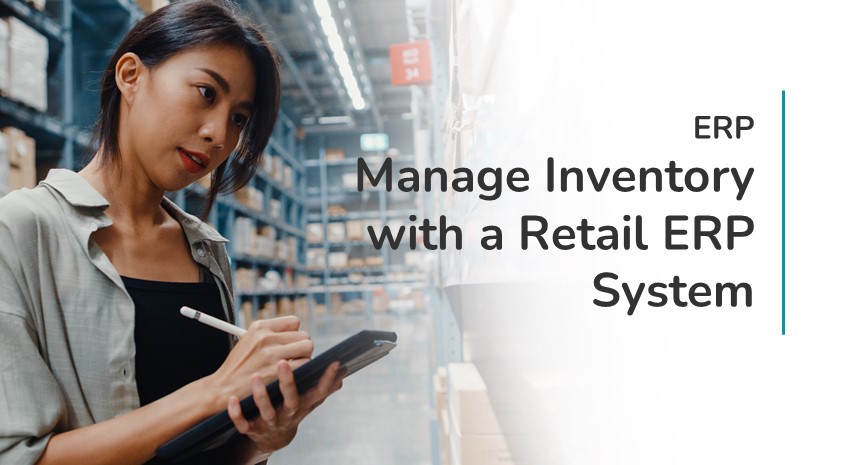Improving Retail Inventory Management: How an ERP System Can Help

Managing inventory may feel like a never-ending balancing act, but that’s where a Retail ERP (Enterprise Resource Planning) system comes in. The all-encompassing data management program can help retailers improve their inventory processes with real-time information, allowing you to manage costs and grow strategically.
Below are three ways retailers can use an ERP system to mitigate the issues that come with managing inventory.
1. Integrate Point of Sale Systems Among Different Retail Locations
Without ERP and POS integration, retailers with multiple locations can’t track overall inventory until an end-of-day audit or, even worse, the next scheduled inventory review. When ERP and POS integration doesn’t exist, the only real-time option is to call the other locations to check their inventory, which is cumbersome and frustrating for both customers and staff. On the contrary, an integrated ERP/POS system improves retail inventory management by allowing you to be more knowledgeable and efficient, which translates to a better customer experience. When a customer purchases an item, the system is updated immediately rather than the next day. Or next week!
An integrated ERP/POS system also reduces the risk of data entry errors that are otherwise done manually. Consider this hypothetical situation: Your company sells products through Amazon using three different software systems. Software A powers the e-commerce site, Software B manages the POS system, and Software C manages the company’s ERP function, which requires manual entries to complete the customer’s order. Additionally, the company must keep the customer informed of the order status and anticipated shipping timeframe, which often requires manual entry in the e-commerce system.
If the customer is not kept informed or receives the wrong item due to a manual entry error, they could post a negative review on social media, which could be devastating. As my mother always said, an ounce of prevention is worth a pound of cure (although in today’s online world, an ounce of prevention is PRICELESS!). Bottom line: an integrated system with inventory management for retail helps ensure order accuracy and significantly improves customer satisfaction.
2. Prevent Stock Outs and Excess Inventory
An additional benefit of an integrated ERP/POS system with inventory management for retail is real-time monitoring of inventory. Don’t you want to know when an item is at or approaching “out-of-stock” status? Or conversely, when you’re fully stocked so you can cancel an automated reorder? Once the inventory values are captured in your ERP system, the software can monitor stock levels and recommend the amount to order. It can even factor in vendor lead time, as well as estimate how long current inventory will last using sales trends from historical sales data.
Your ERP system can also be modified to a “just-in-time” inventory protocol, which could generate significant cost savings for your company. For example, the ERP system can distinguish patterns that may generate savings by combining orders to achieve quantity discounts and/or reduced shipping costs with the overriding priority of maintaining sufficient stock based on anticipated demand.
3. Record Historical Data to Improve Seasonal and Annual Orders
By maintaining an historical record of purchases and sales, an ERP system can efficiently predict inventory needed for promotional and seasonal events or when placing annual orders. It evaluates the following entries: two to five years of historical sales data; supplier forecasts; seasonal and promotional factors; and business constraints, such as warehouse space limitations.
Improving your inventory management for retail will help you operate more efficiently, and efficiency translates to greater profits. When you are ready for help with optimizing your processes and systems, ArcherPoint’s retail experts have decades of experience and can help guide you in the right direction. Contact us today.
Trending Posts
Stay Informed
Choose Your Preferences
"*required" indicates required fields
